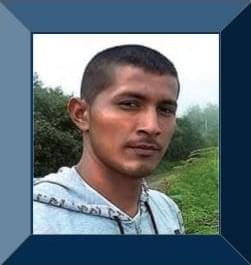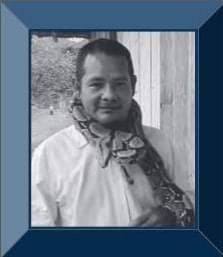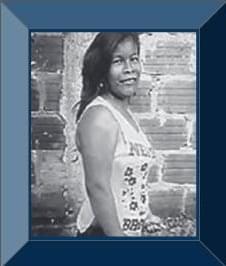On Human Rights Day 2020, ABColombia pays tribute to the immense courage, expertise and determination of Colombian Human Rights Defenders and community leaders (HRDs), through a series of articles reflecting on the stories of some of those killed in Colombia between January and early December 2020.

The work of Colombian HRDs has been, and continues to be, extremely costly; they are threatened, tortured, criminalised, disappeared, raped, extrajudicially executed, kidnapped, dismembered, beaten and killed. Their families are threatened and loved ones killed. The Head of the UN Mission of Verification to Colombia, describes it as an “epidemic of violence” against HRDs and former combatants.
Just as Colombian actors are uniting to confront the pandemic, it is imperative for all actors to end the epidemic of violence against social leaders, human rights defenders and former combatants.
Despite the evident risk to their own lives and the fear that this must entail, HRDs continue to work tirelessly to protect the rights of others, striving to promote democracy, ensure the implementation of the Peace Accord and achieve sustainable peace.
As of 8 December 2020, Indepaz has reported 287 human rights leaders and defenders to have been killed in Colombia since 1 January this year.
However, as noted in a report on Colombia by the UN Human Rights Council in 2020: “reducing the analysis to figures conceals the structural causes of violence against human rights defenders”.
Behind the alarming statistics are countless rural women, indigenous, afro-Colombians, peasant farmers, mothers, fathers, partners, children, brothers, sisters… they are dedicated individuals and collectives who work peacefully in the struggle for a sustainable and just peace, and yet continue to be met with violence.
As of 8 December 2020, 20 of the 260 HRDs killed were from Putumayo. Drawing on a recent report from Somos Defensores and beginning with Putumayo, ABColombia presents the stories of some of the courageous HRDs who were killed while peacefully defending human and environmental rights and supporting the implementation of the Peace Accord.
Putumayo
A south-western region of Colombia that shares borders with Ecuador and Peru, Putumayo is home to the river of Putumayo, one of the tributaries of the Amazon River, whose wealth in natural resources also includes oil. Putumayo also suffers from drug trafficking and coca cultivation due to its borders with other countries and remote rural landscapes.
According to a recent report by Amnesty International (2020), the risks faced by HRDs engaged in defending rights in Putumayo can be ‘directly related to the possession and control of land and natural resources which are disputed by various armed groups or by those who have a major economic interest in them, such as certain non-state actors, including extractive companies.’
Legal representative of the campesino community Association for the Integral and Sustainable Development of La Perla Amazónica (ADISPA) and community leader of the Peasant Farmer Reserve (Zona Reserva Campesina – ZRC) of Perla Amazónica, Jani Silva, illustrates the challenges faced by fellow HRDs in Putumayo:
Before there were only the FARC, but after the signing [of the Agreement] and the departure of the guerrillas, the State has not established a presence here. There is only the army and the company, but they do not serve to bring peace. The army contributes to fear and the company causes contamination”.
Meet Neivan Yordan Tovar

Neivan’s youthful age did not stop him from having an impact while defending his community in Puerto Guzmán. Quite the opposite; at only 26, he was a well known figure, commended for his support of initiatives to resolve rights challenges for peasant farmers, as well as his promotion of the implementation of the Peace Accord.
On the ground in Putumayo, Neivan was the director of the Trade Union of Frontier Agricultural Workers of Putumayo (Sindicato de Trabajadores Campesinos Fronterizos del Putumayo). He was also an active member of the Marcha Patriótica socio-political movement, which publicly campaigns for full implementation of the Peace Accord.
He received death threats as a result of his contributions as a human rights defender, but continued his work nonetheless. On 16 January 2020 Neivan was in a community shop that belonged to the trade union, in the local hamlet of Teteyé, when armed men entered and shot him numerous times.
Meet Marco Leopoldo Rivadeneira

Marco was a well respected figure not only in Putumayo but also across Colombia.
Marco actively worked for the rights of others. He was President of the Farmer Association of Puerto Asís (Asociación Campesina de Puerto Asís – ASOPUERTOASÍS). He supported the development of the Community Action Board (Junta de Acción Comuna – JAC) in villages along the Puerto Vega-Teteyé corridor. As well as, the implementation of the Peace Accord with the Voluntary Crop Substitution Programmes (Programa Nacional Integral de Sustitución de Cultivos de uso Ilícito – PNIS).
Marco worked to represent the campesino community and confront rights violations related to territory and the environment by extractive companies.
Nationally, Marco was a member of the National Board of Agrarian Coordination (Coordinador Nacional Agrario – CNA) and the People’s Congress (Congreso de los Pueblos), as well as a regional spokesperson for the National Guarantees Process (dealing with issues of the protection of HRDs). Marco was also recognised on the international scene; he was a spokesperson for the Coordination Colombia, Europe, USA Operational Committee (Comité Operativo Nacional de la Coordinación Colombia, Europa, Estados Unidos – CCEEU), a partner of ABColombia.
As the abundance of organisations listed suggests, Marco dedicated his life to working for the defence of land and for the rights of local communities.
Somos Defensores have reported that on 19 March 2020, while attending a meeting with other farmers, Marco was kidnapped and killed, allegedly by dissidents of the FARC.
Peasant Farmer Reserve Zone of La Perla Amazónica, Putumayo
The threats against leaders in Putumayo continue. ADISPA’s legal representative, Jani Silva, explains the difficulties Environmental defenders face:
We began to denounce the environmental issues with the oil company and that’s when the threats began [1] (unofficial translation)
The municipality of Puerto Asis is home to the Peasant Farmer Reserve Zone of La Perla Amazónica, (Zona Reserva Campesina de Pearla Amazónica – ZRCPA) part of the Bajo Putumayo (the Amazon Plain), which has an extremely rich biodiversity and water sources. The ZRCPA is managed by the campesino community organisation ADISPA.
ADISPA’s Jani Silva has received consistent threats in the struggle to ensure that the land and natural resources rights of the community are upheld. Amnesty International reported that numerous threats and harassment forced Jani to leave her home in 2017; despite this the threats continue, including being followed, being monitored virtually and being included in a death threat plan by an armed group.
Meet Gentil Hernández Jiménez

Gentil was committed to working for the implementation of the Peace Accord. He was a prominent leader and the driving force behind the implementation of the PNIS programme in the El Mango district of Putumayo.
On the 8 January 2020, Gentil was shot and killed by unknown men. According to Somos Defensores, the local community attributes his murder to members of the Sinaloa Cartel, a Mexican drug trafficking organisation that is present in the region.
Meet Gloria Isabel Ocampo

Gloria Isabel was a well known campesina (peasant farmer) leader. At the age of only 35, she was dedicated in working to defend the rights of the campesino community and combined this with being a mother to two children.
Gloria Isabel was a strong supporter of the implementation for the Peace Accord, supporting PNIS, projects of manual eradication and the formation of development plans with a territorial approach (PDETs); PDETs are a key feature of the Rural Reform Chapter of the Peace Accord. Gloria Isabel continued to work to build peace in Putumayo and a future for her children despite receiving threats since 2019.
Her work as a committed leader is evident, given her former position as President of the Community Action Board (Junta de Acción Comunal, JAC) in the hamlet of La Estrella in Puerto Guzmán. She later continued contributing to the JAC through her work as a secretary; this would be her final role in governance before she was killed.
On 7 January 2020, Gloria was just outside her home alongside her neighbour, when armed men approached her opened fired and shot her repeatedly, killing her.
Meet Edison León Pérez

Edison was a prominent leader of the farming community in the municipality of San Miguel, Putumayo, holding the position of President of the JAC of San Juan Bosco in San Miguel. Edison had been receiving threats since 2019 and as a result had been granted special protection measures from the National Protection Unit (UNP), including the provision of bodyguards.
On 8 June 2020, Edison was followed and attacked by armed men who shot and killed him.
Meet Leidy Viviana Trompeta

Leidy was an Indigenous Guard of the Nasa Kuesh Kiwe council in the hamlet of Bellavista, Putumayo. At the young age of 24, she was regarded highly in her community as an active figure who was dedicated to her work in the defence of the rights of the community.
Alongside her duties as an Indigenous Guard, she was a member of PNIS as well as a mother to two children.
Leidy had previously denounced her former partner, and father of her children, for domestic violence. On the 9 June 2020, Leidy was a victim of femicide; according to Somos Defensores, it is reported that she was hanged in her home by her former partner.
The problem of gendered violence and violent attacks on women social leaders is a reflection of the duality of violence against those defending human rights alongside gender-based violence. Thus, women HRDs who have had to remain at home due to the pandemic can face greater risk of domestic violence in addition to the risk of violence related to their work defending the community.
Amidst this alarming context and the crisis of the killing of fellow defenders, ABColombia commends Putumayo’s Human Rights Defenders and community leaders who continue to struggle to achieve sustainable peace in Colombia.
Look out for the following article in this series, to explore the courageous and costly work of others who were killed in 2020 for seeking to defend and protect the rights of all.
Notes
[1] Spanish original: “Nosotros comenzamos a denunciar temas ambientales con la petrolera y ahí empezaron las amenazas”
